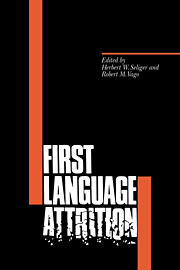Book contents
- Frontmatter
- Contents
- List of figures
- List of tables
- List of contributors
- Acknowledgment
- Part I Survey studies
- Part II Group studies
- 6 L1 loss in an L2 environment: Dutch immigrants in France
- 7 The sociolinguistic and patholinguistic attrition of Breton phonology, morphology, and morphonology
- 8 Language attrition in Boumaa Fijian and Dyirbal
- 9 Pennsylvania German: convergence and change as strategies of discourse
- 10 Lexical retrieval difficulties in adult language attrition
- 11 Spanish language attrition in a contact situation with English
- Part III Case studies
- Index
9 - Pennsylvania German: convergence and change as strategies of discourse
Published online by Cambridge University Press: 14 January 2010
- Frontmatter
- Contents
- List of figures
- List of tables
- List of contributors
- Acknowledgment
- Part I Survey studies
- Part II Group studies
- 6 L1 loss in an L2 environment: Dutch immigrants in France
- 7 The sociolinguistic and patholinguistic attrition of Breton phonology, morphology, and morphonology
- 8 Language attrition in Boumaa Fijian and Dyirbal
- 9 Pennsylvania German: convergence and change as strategies of discourse
- 10 Lexical retrieval difficulties in adult language attrition
- 11 Spanish language attrition in a contact situation with English
- Part III Case studies
- Index
Summary
Introduction
In most immigrant communities across the United States, English eventually fulfills communicative functions once allocated to immigrants' native languages. The immigrant language falls into disuse, and subsequent generations attain only faulty mastery of its rules if they learn it at all. Of interest in this study is the linguistic integrity of the language as it falls into disuse. If speakers no longer use their native language for daily discourse, does the reduction of function result in a corresponding reduction of linguistic form? Linguistic change due to disuse is only one aspect of first language attrition. Attrition may also occur even while the language continues to fulfill daily discourse functions. In intimate contact with a dominant language, minority languages often exhibit changes which suggest attrition in spite of their maintenance. Linguistic change due to disuse and linguistic convergence toward a dominant language due to contact represent two kinds of attrition, and both may be realized as individual or communal language behaviors.
The purpose of this study is to describe instances of language change and convergence as processes of attrition. First language attrition occurs in individuals whose lives have changed in such a way that they have little or no opportunity to use their native language, perhaps for most of their adult years. The language of such individuals exhibits evidence of faulty application of their native language rules.
- Type
- Chapter
- Information
- First Language Attrition , pp. 125 - 138Publisher: Cambridge University PressPrint publication year: 1991
- 6
- Cited by



